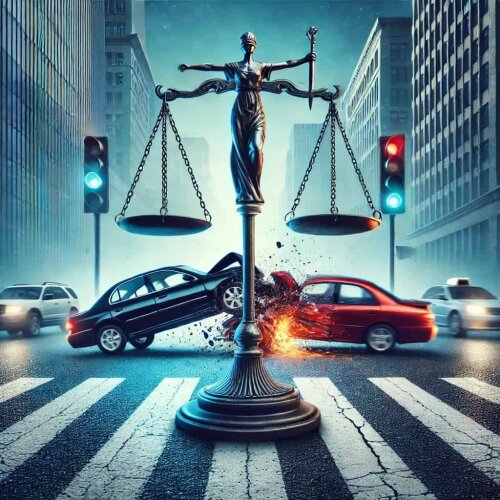Best Truck Accident Lawyers in Portland
Share your needs with us, get contacted by law firms.
Free. Takes 2 min.
List of the best lawyers in Portland, United States
About Truck Accident Law in Portland, United States
Truck accidents involve different legal issues than typical car crashes because commercial trucks are larger, often subject to federal and state safety regulations, and usually backed by commercial insurance. In Portland, truck accident cases are handled under Oregon state law while also involving federal regulations that apply to interstate and many intrastate commercial carriers. Common legal issues include determining fault among multiple parties, establishing violations of safety rules, and proving economic and non-economic damages for injured people or families.
This guide is informational only and does not create an attorney-client relationship. If you need legal advice for a specific situation, consult a licensed attorney.
Why You May Need a Lawyer
Truck accident cases are often more complex than standard car accidents. You may need a lawyer if your case involves serious injury or death, broken or disputed liability, claims against multiple parties, unclear insurance coverage, or violations of federal trucking regulations.
Common situations where people need a lawyer include:
- Catastrophic injuries such as traumatic brain injury, spinal cord injury, amputation, or severe burns.
- Wrongful death cases where a family seeks compensation for a deceased loved one.
- Multiple liable parties such as the driver, the trucking company, a cargo loader, a vehicle manufacturer, or a maintenance provider.
- Commercial insurers or trucking companies deny responsibility, pressure you to accept a low settlement, or seek recorded statements early in the claim.
- Need to obtain specialized evidence such as electronic logging device data, driver maintenance records, black box information, or trucking company hiring and safety files.
Local Laws Overview
Key aspects of local and state law that are particularly relevant in Portland include:
- Statute of limitations - For most personal injury claims in Oregon the statute of limitations is two years from the date of injury. This deadline can bar recovery if you wait too long. Different deadlines may apply for wrongful death claims or claims against government bodies.
- Comparative fault - Oregon follows a modified comparative fault rule. You can recover damages only if you are less than 51 percent at fault. Your award is reduced in proportion to your share of fault.
- Government claims - If a government agency or employee is involved, special notice and shorter filing deadlines can apply. Many public-entity claims require written notice within a limited time period, often around 180 days, and different procedural rules apply.
- Federal trucking regulations - Federal Motor Carrier Safety Administration rules affect driver qualifications, hours-of-service limits, electronic logging device requirements, drug and alcohol testing, vehicle maintenance, and cargo securement. Evidence that these rules were violated can be key to proving negligence.
- Insurance and liability - Commercial trucks generally carry higher liability limits than personal vehicles. Liability can extend to the trucking company under vicarious liability principles, to third parties such as shippers or maintenance firms, and sometimes to part manufacturers for defects.
- Evidence-preservation and discovery - Because trucking companies often act quickly to preserve or alter records, it is important to act promptly to secure evidence such as driver logs, ELD data, maintenance records, surveillance footage, and the truck itself for inspection.
Frequently Asked Questions
How soon do I need to contact a lawyer after a truck accident?
Contacting a lawyer soon after a serious truck accident is important. Key evidence can be lost or destroyed, and statutory deadlines apply. If your injury is significant or liability is disputed, consult an attorney as early as possible to preserve evidence and protect your rights.
What is the statute of limitations for truck accident injury claims in Oregon?
For most personal injury claims in Oregon the statute of limitations is two years from the date of injury. Different deadlines may apply to wrongful death claims or claims against public entities, which can have shorter notice periods. Confirm deadlines with an attorney promptly.
Who can be held liable in a truck accident?
Potentially liable parties include the truck driver, the trucking company or carrier, the vehicle owner, cargo loaders, maintenance or repair shops, parts manufacturers, and shippers. Liability depends on the facts, including negligence, unsafe loading, poor maintenance, defective parts, or inadequate hiring and training.
What kinds of damages can I recover after a truck accident?
You may recover economic damages such as past and future medical care, lost wages, and property damage. You may also recover non-economic damages such as pain and suffering, emotional distress, and loss of enjoyment of life. In rare cases involving reckless conduct, punitive damages may be sought.
Should I give a recorded statement to the trucking company or insurer?
Do not give a recorded statement without first consulting an attorney. Insurers may use statements to limit or deny claims. You should provide basic facts to law enforcement and your insurer for medical payments, but avoid detailed or recorded statements until you understand your legal position.
What evidence is most important in a truck accident case?
Important evidence includes police reports, photos and videos of the scene, witness statements, driver information and logs, electronic logging device data, maintenance and inspection records, driver training and hiring files, cargo manifests, black box data, and medical records documenting injuries and treatment.
How does comparative fault affect my claim?
Under Oregon law you can recover damages only if you are less than 51 percent at fault. Your recovery is reduced by your share of fault. For example, if a jury finds you 20 percent at fault, your award is reduced by 20 percent. If you are 51 percent or more at fault, you cannot recover damages.
What if the truck was owned by a government agency?
Claims against government entities involve special rules. You often must provide written notice within a short time period and follow specific procedures to preserve a claim. Consult an attorney promptly if a government vehicle or employee was involved.
How long does a truck accident case take to resolve?
The timeline varies widely. Simple cases may settle in months, while complicated or contested cases can take a year or more and sometimes several years if they go to trial. Factors that affect timing include the severity of injuries, complexity of liability, availability of evidence, and court schedules.
Will my health insurance or auto insurance pay my medical bills first?
Health insurance often covers medical treatment immediately under your policy, and your insurer may seek reimbursement later from any settlement through subrogation. Personal auto medical coverage may also apply. Keep careful records of payments and notify your insurers and an attorney to address liens and repayment obligations.
Additional Resources
Government and enforcement bodies:
- Federal Motor Carrier Safety Administration - For federal trucking safety rules and carrier information.
- Oregon Department of Transportation - For state roadway regulations and commercial vehicle programs.
- Oregon State Police - Commercial Vehicle Enforcement - For state-level enforcement of commercial vehicle laws and crash investigations.
- Port of Portland - For local port-related trucking and permitting issues.
Legal and industry resources:
- Oregon State Bar - For lawyer referral services and public information about hiring an attorney.
- Oregon Trial Lawyers Association - For resources on civil litigation and serious personal injury representation.
- Trucking industry groups - For industry standards and carrier contact information.
Medical and safety organizations:
- Local trauma centers and hospitals - For treatment and documentation of serious injuries.
- National organizations focused on roadway safety - For statistics and safety guidance.
Next Steps
1. Seek medical attention immediately - Your health is the top priority. Get a full medical evaluation and follow prescribed care. Medical records are essential evidence for any claim.
2. Report the crash - Call 911 at the scene or report the accident to local law enforcement. Obtain a copy of the police report number and officer contact information.
3. Preserve evidence - Take photos if you can, keep damaged clothing, note vehicle information such as the truck number and license plate, and gather witness names and contact information.
4. Notify your insurer - Report the crash to your auto or health insurer as required by your policy, but avoid detailed recorded statements until you have legal guidance.
5. Do not sign releases or accept early offers - Insurance companies may pressure you to accept quick settlements that do not fully cover future medical needs. Consult an attorney before signing anything.
6. Consult an experienced truck accident attorney - An attorney who handles commercial vehicle cases can evaluate liability, preserve critical evidence, communicate with insurers, and advise on claims against multiple parties. Many attorneys offer free consultations and work on a contingency-fee basis, where fees are paid only if you recover.
7. Keep organized records - Maintain a file with all medical bills, wage-loss documentation, repair estimates, correspondence, and receipts related to the crash and your recovery.
If you need legal help, choose a lawyer with experience in commercial vehicle litigation and a track record handling serious injury or wrongful death cases. Early action and the right representation can protect evidence and improve your chances of a fair recovery.
Lawzana helps you find the best lawyers and law firms in Portland through a curated and pre-screened list of qualified legal professionals. Our platform offers rankings and detailed profiles of attorneys and law firms, allowing you to compare based on practice areas, including Truck Accident, experience, and client feedback.
Each profile includes a description of the firm's areas of practice, client reviews, team members and partners, year of establishment, spoken languages, office locations, contact information, social media presence, and any published articles or resources. Most firms on our platform speak English and are experienced in both local and international legal matters.
Get a quote from top-rated law firms in Portland, United States — quickly, securely, and without unnecessary hassle.
Disclaimer:
The information provided on this page is for general informational purposes only and does not constitute legal advice. While we strive to ensure the accuracy and relevance of the content, legal information may change over time, and interpretations of the law can vary. You should always consult with a qualified legal professional for advice specific to your situation.
We disclaim all liability for actions taken or not taken based on the content of this page. If you believe any information is incorrect or outdated, please contact us, and we will review and update it where appropriate.










